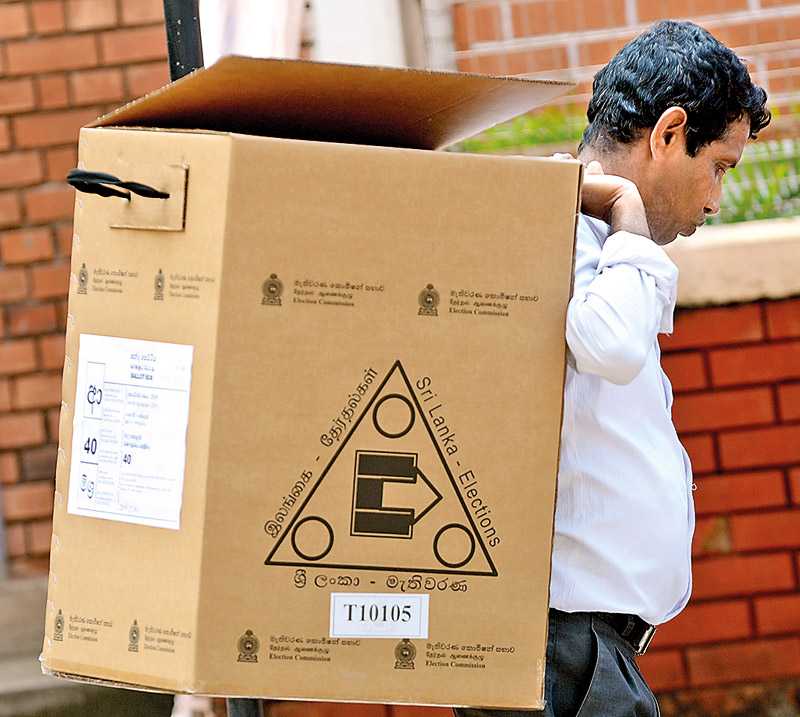Sunday Feb 22, 2026
Sunday Feb 22, 2026
Thursday, 13 May 2021 00:00 - - {{hitsCtrl.values.hits}}

 It has been reported in the press that 14 MPs were appointed to a Parliamentary Select Committee (PSC) to identify appropriate reforms for Sri Lanka’s election laws and electoral system.
It has been reported in the press that 14 MPs were appointed to a Parliamentary Select Committee (PSC) to identify appropriate reforms for Sri Lanka’s election laws and electoral system.
As sovereign voters, we are surprised to note that that such a decision has been taken at a time when an ‘Expert Committee’ appointed by the President is nearing completion of its task in regard to a new constitution, which includes a chapter on franchise and electoral reforms. Besides, it is a plumb ‘conflicts of interest’ for them to originate ‘electoral reforms’ which directly prevail over them, who only serve as agents/representatives of the sovereign voters. The sad irony is that, the roles have been reversed over the years!
Anyway, let us look at the procedure for the passage of the proposed new constitution outlined by former Secy. General of Parliament Nihal Seneviratne as follows:
“These eminent lawyers would sift through the representations and memorandums received and prepare a draft report which is expected to be submitted to the President. The President is expected to submit the report and draft to the Speaker and the Speaker would submit this report and thereafter appoint a Select Committee comprising members from both the Government and the Opposition.
“The Select Committee following the usual established procedure would invite representations from the public and would study all these memorandums and submit the report back to Parliament with their recommendation. It would deliberate at length, studying all the representation made and submit its final report to Parliament.”
Therefore, the said appointment of a PSC is preposterous and is a direct contravention of the existing protocol. The preparation of a Draft report by an ‘Experts Committee’ consisting of eminent lawyers is acceptable as the Ministry of Justice has initially called for proposals from the public for their consideration.
However, the said ‘usual established procedure’ simply allows the politicians acting as ‘agents/representatives’ of the sovereign voters to usurp the powers of the ‘principals,’ to bulldoze their own way through a ‘Parliamentary Select Committee’ under the 'eyewash' of inviting representations from the public.
As we know, such a Select Committee consisting of a majority of unprincipled, selfish and egoistic Parliamentarians will collude to even overturn the very objective of the ‘Draft Report’ in order to protect their privileges and vested interests particularly coupled with ‘electoral reforms’. The process will continue with a two-third Parliamentary majority followed by the final ‘eyewash’ of a ‘referendum’ where the people are asked to say ‘yes’ or ‘no’ to a question framed according to the whims and fancies of the politicians.
A transparent method for sovereign voters to originate ‘electoral reforms’ and the new constitution?
The aforesaid procedure clearly violates ethical norms, natural justice and the principles of the ‘law of agency’. Moreover, considering the potential for so called ‘slips’ occuring between the ‘cup and the lip’, at the Parliament under the existing procedure, we propose the following ‘system change’ to rectify this unfortunate situation by using the section covering 'electoral reforms' as an example.
1) As has already been proposed, the President on the advice of the independent National Elections Commission (NEC) shall set up a 'Permanent Civilian Task Force for Electoral Reforms’ comprising NEC-selected eminent retired judges and the academia possessing the requisite expert knowledge together with ‘sovereign voter dedicated’ organisations like PAFFREL, CAFFE, CMEV and other concerned civil rights organisations and activists with practical knowledge as its members. Political representatives/agents would be fundamentally barred from this task force due to the obvious ‘conflict of interest’ and the operation of ‘the law of agency’ as aforesaid. Besides, the majority of them lack a thorough knowledge in constitution making. The sad plight of the previous Parliament sitting as a ‘Constitution Assembly’ for four-and-a-half years with no result bears ample testimony to this fact.
2) The task force shall study the relevant section of the ‘draft report’ submitted by the president and prepare its own draft on ‘electoral reforms’ for submission to the National Elections Commission (NEC).
3) The NEC in turn will whet the latter draft and in keeping with the principles of ‘people based governance’, place its own draft before the people through the mass media for their final comments and clearance within a specified timeframe.
4) Thereafter, the NEC will prepare the final draft and submit same to the Supreme Court for clearance.
5) The same final draft together with comments/recommendations of the Supreme Court shall be sent to Legal Draftsman for preparation of the relevant section in the new constitution.
6) Such final draft of the section prepared by the Legal Draftsman as per 5 above should be placed before the people through the mass media for their final comments, if any, within a specific timeframe.
7) Thereafter, the final document should be placed before the Parliament purely for formal approval.
Finally, we recommend that the above transparent procedure be followed in respect of all other relevant sections of the new constitution within specified timeframes to ensure facilitation of ‘people based governance’ through a robust constitution.
Last but not the least, as a result of this exercise, the people and the politicians themselves will become more conscious and aware of the basic laws of the country.
Bernard Fernando
Moratuwa